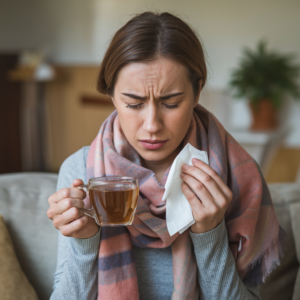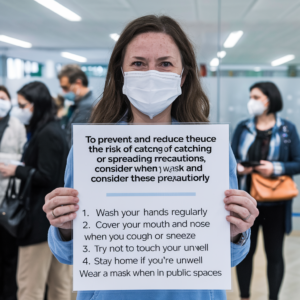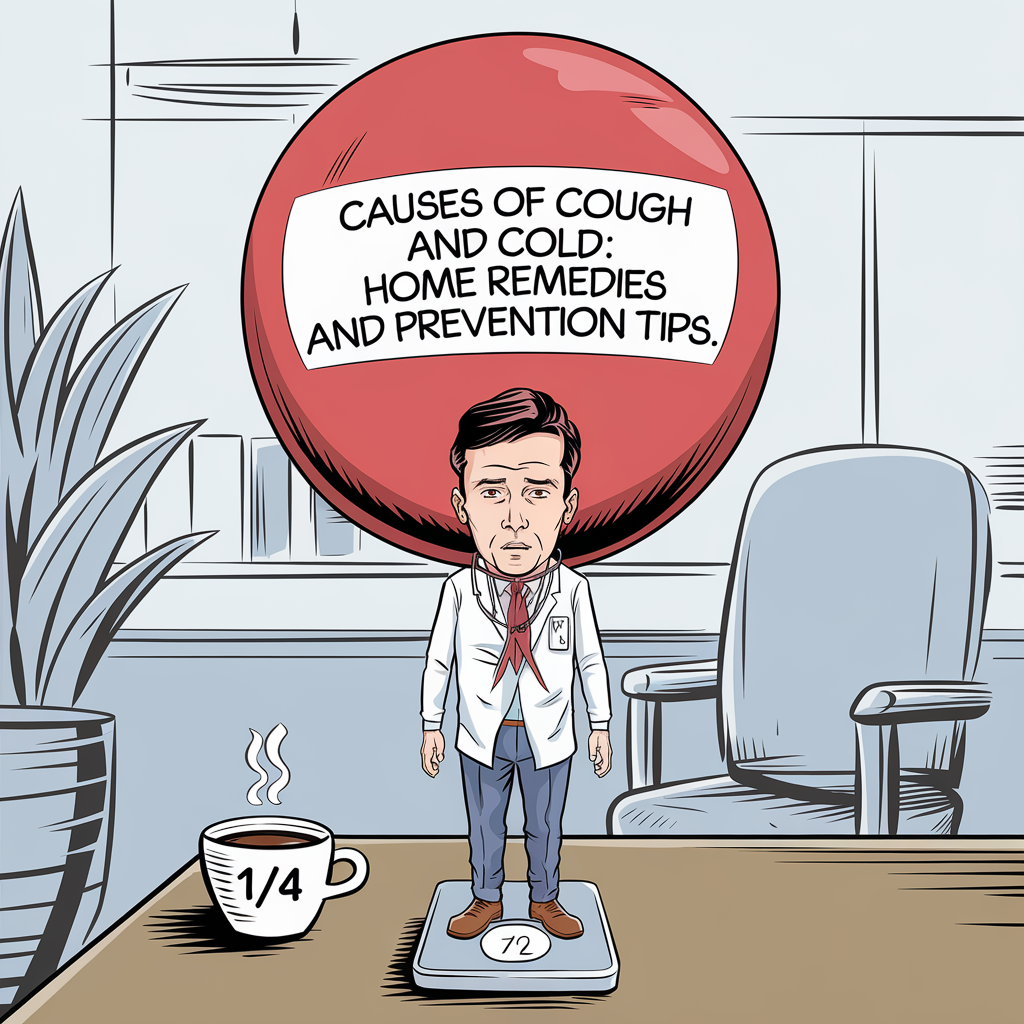“Causes of Cough and Cold: Home Remedies and Prevention Tips.”

Cold;
A cold is a viral infection that primarily affects the upper respiratory tract, including the nose, throat, and sinuses. It is commonly caused by viruses like rhinoviruses, coronaviruses, and adenoviruses.
Symptoms may include a runny or stuffy nose, sneezing, sore throat, mild fever, fatigue, and watery eyes.
The cold is contagious and spreads through droplets from sneezing, coughing, or touching contaminated surfaces.
Cough;
A cough is a reflex action that helps clear the airways of irritants, mucus, or foreign particles. It can be a symptom of a cold, flu, or other respiratory conditions.
Coughs can be dry (non-productive) or wet (productive):
Dry Cough: Usually triggered by irritation in the throat and doesn’t produce mucus.
Wet Cough: Involves mucus or phlegm production, often caused by infections.
The main causes of cough and cold
1. Viral Infections

Common Cold Viruses: The most frequent cause of colds is rhinoviruses, which account for up to 40% of cases. Other viruses like coronaviruses, adenoviruses, and respiratory syncytial viruses (RSV) can also cause cold symptoms.
Influenza (Flu): The flu virus can cause symptoms similar to a cold, but they are typically more severe and may include fever, body aches, and fatigue.
2. Environmental Factors
Cold Weather: Exposure to cold temperatures and dry air can irritate the respiratory tract, making it easier for viruses to infect the body.
Allergens: Dust, pollen, mold, and other allergens can cause a cough due to throat irritation or post-nasal drip.
3. Weakened Immune System
Individuals with a weakened immune system are more susceptible to catching a cold or experiencing more severe symptoms.
4. Close Contact with Infected Individuals
Colds and coughs spread easily through droplets when an infected person coughs or sneezes. Touching surfaces contaminated with the virus and then touching your face can also lead to infection.
5. Smoking and Air Pollution
Exposure to cigarette smoke or air pollution can irritate the airways, making a person more prone to developing a cough.
Understanding these causes can help in preventing and managing cough and cold symptoms effectively.
“Home Remedies for Cough and Cold That Actually Work!”
Ingredients:
1. lemon & honey syrup
1/2 – lemon juice( fresh ) or 1 lime juice 1 tsp – honey ( use 1/4 tsp for 1 year old baby )
note: for 1 – 2 year olds,use 1/4tsp honey,for 2+ year kids & adults – use 1 tsp honey
2. Thyme or Tulsi water (cold cough remedy)
Ingredients: ( for #2 – Thyme or tulsi water )
1 tbsp or 20 sprigs – Thyme leaves ( or 5 tulsi leaves )

1 tsp – cumin seeds 2 cups – water ( 500ml / half litre )
3. Orange & honey juice (cold cough remedy)
Ingredients: ( for #3 – Orange & honey juice )
1 – orange (small) or 1/2 big orange
1/2 cup – water ( drinking water )
1/4 tsp – honey
note: For 1 – 5 year olds, use 1 small orange
For 5+ year kids & adults, use 1 big orang
For more detail;https://www.youtube.com/watch?v=jrAPIXvkwQA
4. Saltwater Gargle(Graray in urdu)
Gargling with warm salt water helps reduce throat irritation and mucus buildup. Do this 2-3 times a day.
5. Ginger Tea(Adrak wali chae)
Boil fresh ginger slices in water for 10 minutes. Drink the tea to reduce throat inflammation and ease coughing.
6. Steam Inhalation
Inhale steam from a bowl of hot water or a humidifier to loosen mucus and relieve congestion. Adding a few drops of eucalyptus oil can enhance the effect.
To prevent and reduce the risk of catching or spreading cough and cold, consider these precautions:
1. Practice Good Hygiene
Wash Hands Frequently: Use soap and water to wash hands for at least 20 seconds, especially after coughing, sneezing, or being in public places. Hand sanitizers with at least 60% alcohol are also effective.
Avoid Touching Face: Keep your hands away from your eyes, nose, and mouth to prevent viruses from entering the body.
2. Maintain a Healthy Lifestyle
Boost Your Immune System: Eat a balanced diet rich in fruits and vegetables, get regular exercise, stay hydrated, and ensure adequate sleep.
Quit Smoking: Smoking weakens the respiratory system and makes you more susceptible to infections.
3. Avoid Close Contact with Infected People

Stay Away from Sick Individuals: If someone around you has a cold, keep a safe distance to reduce the risk of transmission.
Use a Mask: Wearing a mask in crowded places, especially during cold and flu season, can help protect you from airborne viruses.
4. Disinfect Frequently-Touched Surfaces
Clean and Disinfect: Regularly wipe down objects and surfaces like doorknobs, phones, and keyboards to minimize the spread of germs.
5. Stay Warm in Cold Weather
Dress Appropriately: Keep yourself warm in cold weather to avoid weakening your immune system.
Use a Humidifier: Dry indoor air can irritate your respiratory system, so using a humidifier can help keep airways moist.
6. Get Vaccinated
Flu Vaccine: Annual flu shots can reduce the risk of influenza, which shares symptoms with the common cold.
7. Practice Cough and Sneeze Etiquette
Cover Your Mouth and Nose: Use a tissue or your elbow to cover your mouth and nose when you cough or sneeze. Dispose of tissues immediately.
FAQ section;
### 1. **What causes cough and cold?**
Mainly viral infections (e.g., rhinoviruses, flu), cold weather, allergens, and a weak immune system.
### 2. **How can I prevent it?**
Practice good hygiene, boost immunity, disinfect surfaces, avoid sick people, and wear a mask in crowded places.
### 3. **What home remedies help?**
Warm fluids, honey, steam inhalation, saltwater gargles, and natural herbs like thyme and tulsi.
### 4. **When should I see a doctor?**
If symptoms last over 10 days, worsen, or involve high fever, chest pain, or difficulty breathing.
### 5. **Are cough and cold contagious?**
Yes, especially early on, spreading via droplets from coughs, sneezes, or contaminated surfaces.
### 6. **Can I exercise with a cold?**
Light exercise is fine if symptoms are mild; avoid if you have a fever or body aches.
### 7. **Do natural remedies work better than medications?**
They help alleviate symptoms but may not act as quickly as medicines. Consult a doctor.
### 8. **Why does cough worsen at night?**
Lying down can cause mucus buildup. Use a humidifier and elevate your head.

